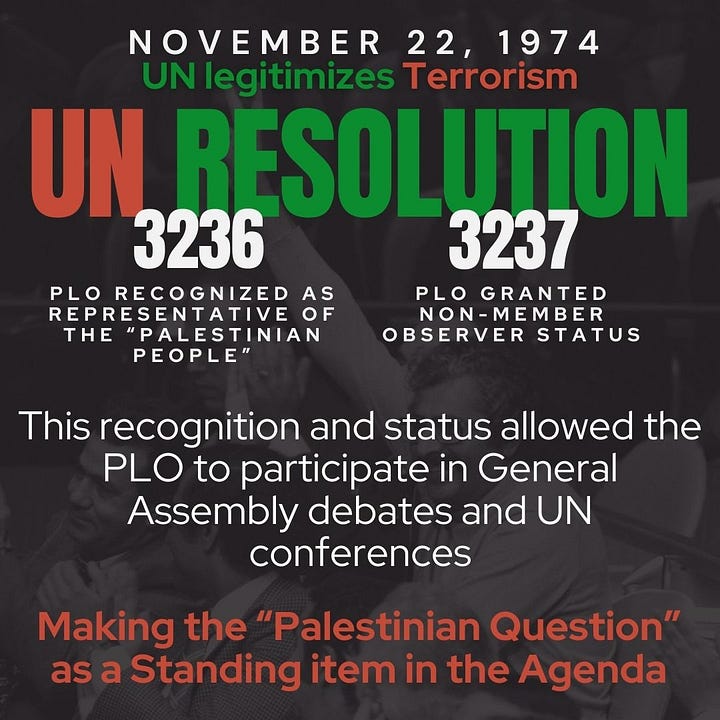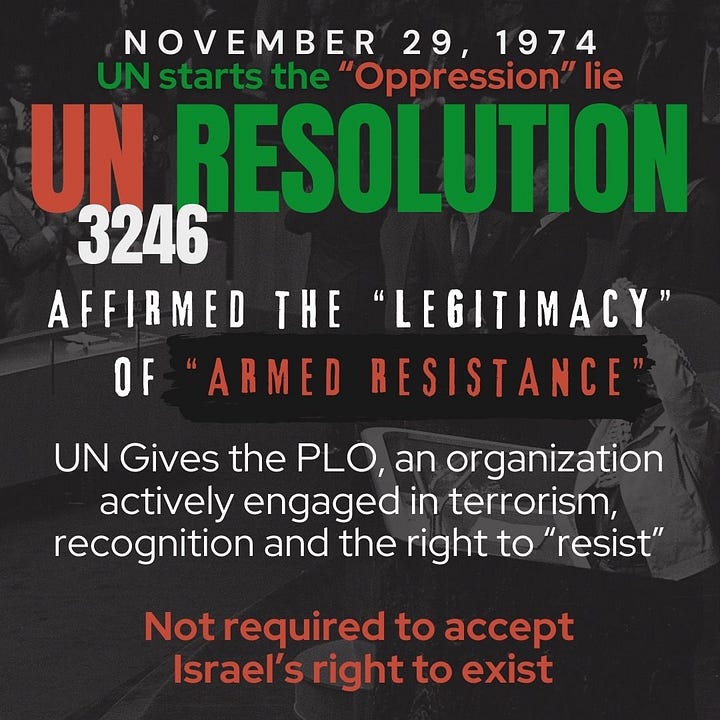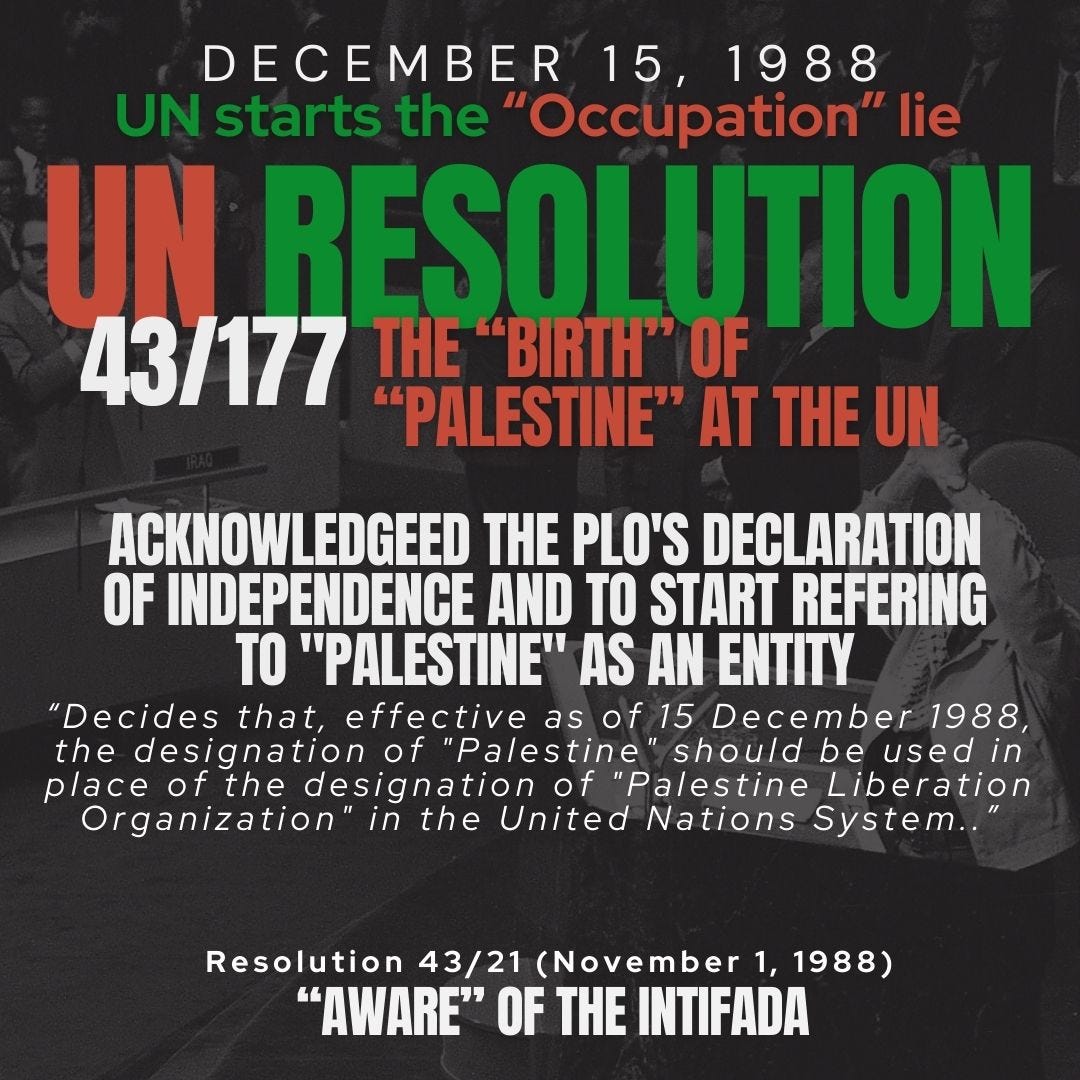Arafat address at the UN from Geneva and The UN's History of Embracing Terrorism
December 13, 1988, Yasser Arafat addresses UN in Geneva
On December 13, 1988, Yasser Arafat, leader of the Palestine Liberation Organization (PLO), addressed the United Nations General Assembly (UNGA). While his speech was full of empty rhetoric about peace and Palestinian self-determination, it symbolized a disturbing and dangerous act by the world’s leading international body: the UN legitimized terrorism.
This moment was made possible by the UNGA's shameful decision just days earlier, on December 2, 1988, to allow Arafat to speak from Geneva after the US denied him a visa to enter New York. The UN went to unprecedented lengths, allowing Arafat to address the assembly from outside the UN’s headquarters—an embarrassing concession to a terrorist.
By 1988, the UN’s moral collapse was undeniable. Only a month before Arafat’s speech, the UN had tacitly endorsed the First Intifada, a violent uprising marked by attacks on civilians, stone-throwing, and bombings. The UN’s "acknowledgment" of the Intifada was a quiet endorsement of terrorism as a legitimate political tool. Just days later, the General Assembly upgraded "Palestine" to the status of a "non-member observer state," further delegitimizing Israel despite ongoing Palestinian violence and terrorism.
The events of December 1988—Arafat’s speech, the recognition of Palestine, and the quiet endorsement of terrorism—were a shameful betrayal of the UN’s founding principles. Instead of promoting peace, the UN legitimized violence and terrorism, undermining its own credibility and turning a blind eye to its mission to foster peace and human rights.
The UN’s Long History of Legitimizing Terrorism
This wasn’t the first instance of the UN enabling Arafat and the PLO’s violence. In 1974, UN Secretary-General Kurt Waldheim, a former Nazi from the SS, invited Arafat to address the UNGA. Arafat, wearing a holstered pistol, made a clear statement about the PLO’s commitment to violence, yet the UN failed to condemn this. Instead, it gave him a platform, offering him unprecedented legitimacy as the representative of the Palestinian people.
Days later, the UN granted the PLO observer status, a dangerous precedent for recognizing terrorist organizations. Even more shockingly, the UN passed a resolution endorsing the PLO’s "right to resist"—a euphemism for violent struggle. This marked the first time the UN endorsed terrorism as a legitimate form of resistance. The UN essentially sanctioned murder, bombings, and violence against Israel under the guise of national liberation, betraying the very ideals of peace and diplomacy it was founded on.
The UN’s decision to legitimize Arafat and the PLO set a catastrophic precedent, rewarding terrorism with recognition. It showed that violence could be cloaked in political rhetoric and gain international approval, a grotesque distortion of the UN’s supposed mission to foster global peace and cooperation.


The UN’s Most Recent Failure: Refusing to Condemn Hamas
Further compounding this disgrace, UN Secretary-General António Guterres made a shameful comment that Hamas's attack "did not happen in a vacuum," implying a justification for Hamas’s terror and brutal massacre. This inflammatory statement and later his failure to condemn Iran for its unprecedented missile attack against Israel, leading Israel to declare him "persona non grata," a rare diplomatic rebuke underscoring the deep dissatisfaction with the UN's failure to take a firm stand against terrorism and attacks against the Jewish State.
Moreover, the UN’s obsession with protecting UNRWA (United Nations Relief and Works Agency) illustrates another layer of moral bankruptcy. This agency, far from being an impartial humanitarian organization, has not only been infiltrated by terrorists but was also created with a specific political agenda against Israel. UNRWA perpetuates the conflict by maintaining the status quo of “refugee camps” and encouraging generations to view violence as an acceptable means of resistance. Its indoctrination of children into hate and terrorism serves as a tool to prolong the conflict, furthering a cycle of violence rather than fostering peace. The UN’s blind support for such an agency, despite its blatant role in fueling extremism, is a disgrace to its own stated goals of peace and security.
This failure was not isolated. The UN has repeatedly rejected efforts to include Hamas and its violence in resolutions. For example, in 2018, a text condemning Hamas on a resolution against Israel was put forward, but attempts to include Hamas were blocked by members who either sympathized with Hamas or sought to avoid alienating key Arab states. Similarly, the UN has consistently resisted efforts to designate Hamas a terrorist organization, even though its record of violence is indisputable. The United Nations went as far as allowing a video message statement from Hamas leader Ghazi Hamad thanked Canada, Australia and New Zealand for backing a ceasefire in Gaza in December 2023
The UN’s pattern of appeasing regimes and groups that maintain power through violence and terror is not limited to Hamas. The UN has also engaged with and legitimizes the Taliban, a regime with a long history of brutal repression and terrorist activities, and has even pushed for recognizing their legitimacy at the UN floor. Similarly, now in Syria, the UN has shown willingness to engage with figures responsible for acts of terrorism, since the fall of Bashar al-Assad’s regime, the UN’s Spokesperson for the Secretary General expressed the UN’s willingness to work with al-Qaeda affiliate Hayat Tahrir al-Sham (HTS) and its leader Abu Mohammad al-Joulani, someone declared a terrorist by the UN Security Council since 2013 and United States $10 million reward for information leading his arrest. These actions further expose the UN’s ongoing failure to uphold its commitment to peace and security and embrace for terrorism.


https://x.com/HillelNeuer/status/1648703321698344960 https://x.com/HillelNeuer/status/1851570722201534794
A Legacy of Shame
Looking back, it’s clear that December 13, 1988, was not just another turning point for further legitimizing terrorism but a tragic moment for the UN itself. The speech, the resolutions, and the decisions made that year should stand as a stark reminder of how easily international institutions can be manipulated by those willing to use violence and terror to further their political goals. For those who believe in peace, justice, and the protection of innocent life, the UN’s actions over the decades remain a profound betrayal of the principles it was meant to uphold.
Moreover, as evidenced by its continued refusal to condemn Hamas, the UN's legacy of legitimizing terrorism persists into the present day. By continuing to fail to act against Hamas, the UN remains complicit in the normalization of terrorism on the world stage. The UN’s moral blindness, both in the 1980s and today, is a reminder of how institutions meant to promote peace and security can fall prey to the very forces of violence they are meant to oppose.




